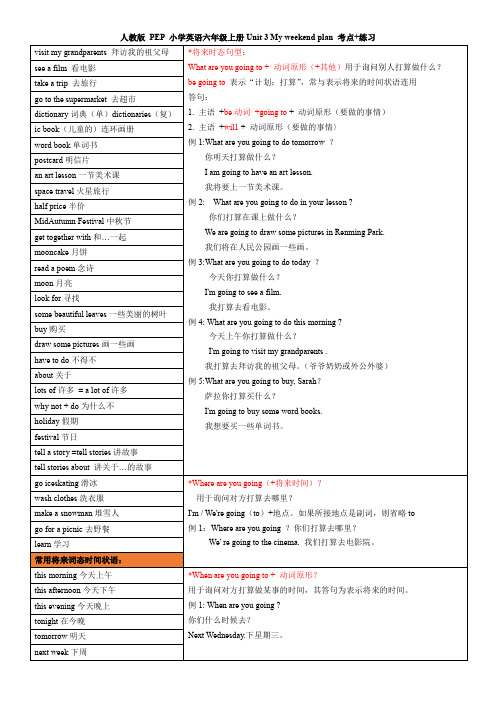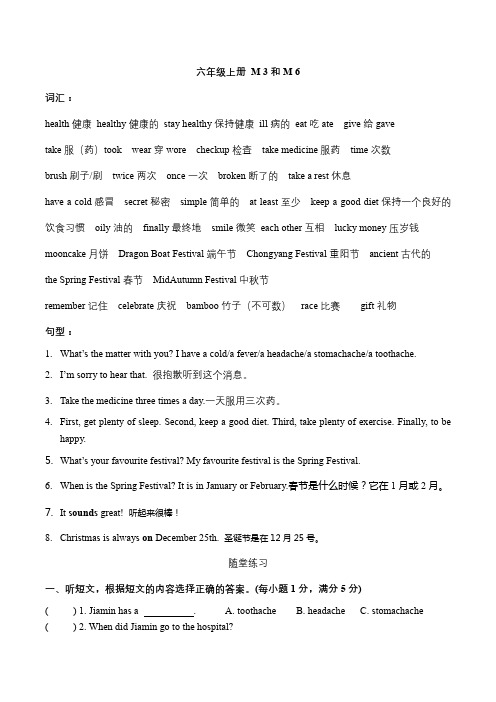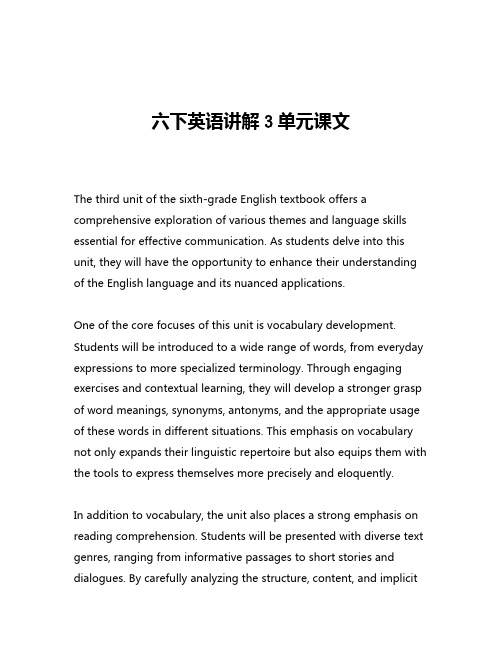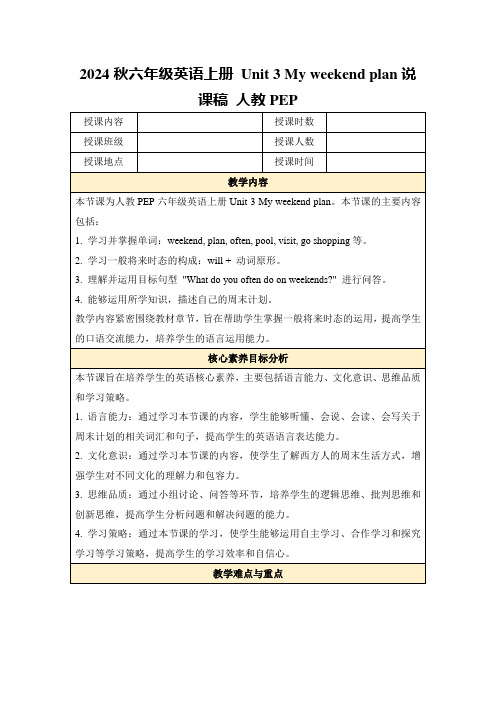6年级英语个性化辅导讲义3
Unit3Myweekendplan(讲义)人教PEP版英语六年级上册

人教版PEP 小学英语六年级上册Unit 3 My weekend plan 考点+练习一、用下划线标出下列单词的重读音节。
(1)visit (2)tonight (3)postcard (4)together (5)dictionary (6)ic二、选出下列每组单词中与其他两项不同类的一项。
(1)()A.word book B.ic book C.next week (2)()A.post office B.maths book C.pet shop (3)()A.tonight B.tomorrow C.visit (4)()A.postcard B.take C.dictionary (5)()A.lesson B.moon C.sun三、英汉互译(1)明信片(2)去旅行(3)词典(4)下周(5)看电影(6)超市(7)this morning (8)get together (9)tomorrow (10)ic book四、单选题1.She a film tomorrow.A.is going to see B.seeing C.sees2.My cousin lives in Hong Kong. Next week, I her. A.visit B.is visiting C.am going to visit 3.Mike is going to visit his grandparents . A.next week B.every day C.now4.Sarah Chinese and does her homework. A.teach B.study C.studies5. I'm going to buy some .A.dictionary B.ic book C.ic books 6.—are you going to do tomorrow?—I am going to play sports in the playground.A.What B.When C.Where7. I'm going to buy a book space travel.A.about B.in C.of8.Lucy is going to Beijing .A.next Saturday B.every day C.last week 9.John is going to a ic book.A.buy B.buying C.buys10.—are you going?—We are going at 8:00.A.Who B.When C.What五、选内容补全对话。
Module3Module6(讲义)教科版(广州)英语六年级上册

六年级上册M 3和M 6词汇:health健康healthy健康的stay healthy保持健康ill病的eat吃ate give给gavetake服(药)took wear穿wore checkup检查take medicine服药time次数brush刷子/刷twice两次once一次broken断了的take a rest休息have a cold感冒secret秘密simple简单的at least至少keep a good diet保持一个良好的饮食习惯oily油的finally最终地smile微笑each other互相lucky money压岁钱mooncake月饼Dragon Boat Festival端午节Chongyang Festival重阳节ancient古代的the Spring Festival春节MidAutumn Festival中秋节remember记住celebrate庆祝bamboo竹子(不可数)race比赛gift礼物句型:1.What’s the matter with you? I have a cold/a fever/a headache/a stomachache/a toothache.2.I’m sorry to hear that. 很抱歉听到这个消息。
3.Take the medicine three times a day.一天服用三次药。
4.First, get plenty of sleep. Second, keep a good diet. Third, take plenty of exercise. Finally, to behappy.5.What’s your favourite festival? My favourite festival is the Spring Festival.6.When is the Spring Festival? It is in January or February.春节是什么时候?它在1月或2月。
Unit 3 My weekend plan(说课稿)人教PEP版英语六年级上册

Unit 3 My weekend plan一、教学目标1.学习并掌握有关周末计划的基本日常用语。
2.通过听、说、读、写的训练,让学生能够准确地表达自己的周末计划。
3.通过本单元的学习,培养学生的交际能力。
二、教学重点1.掌握并运用本单元的词汇和日常用语2.掌握并运用实用语法,如一般现在时和情态动词can。
3.通过阅读、听力和口语训练,提高学生的阅读与听说能力。
三、教学难点1.运用一般现在时和情态动词can来表达周末计划。
2.让学生学会提出问题和回答问题的方法。
四、教学方法1.听力训练法,通过听力来训练学生的听力和口语表达能力。
2.阅读训练法,通过阅读来提高学生的阅读能力。
3.口头交流法,通过交流来训练学生的口语表达能力。
五、教学过程第一节环节首先向学生介绍本单元的主题,并通过演示让学生熟悉有关的日常用语。
比如我们可以这样问学生:1.What do you usually do on weekends?2.Do you have any plans for this weekend?教师自己可以先以自己的周末计划为例,并且逐一展示出关键词汇,如go shopping,visit grandparents等。
第二节环节接下来,介绍本单元的语法部分:一般现在时和情态动词can。
我们可以通过问题的形式来引导学生:1.简单的句子练习:What do you do on the weekends? - I play football.What does he do on the weekends? - He watches TV.What does she do on the weekends? - She visits her grandparents.2.一般现在时加can:Can you swim? - Yes, I can.Can he sing? - No, he can’t.Can she dance? - Yes, she can.3.以can为主语的句子:Can we go to the park together? - Sure, that sounds great.Can he come to my house this weekend? - Sorry, he can’t. He has other plans.第三节环节接下来,将语法和实际应用相结合,让学生运用所学的知识来描述自己的周末计划。
六下英语讲解3单元课文

六下英语讲解3单元课文The third unit of the sixth-grade English textbook offers a comprehensive exploration of various themes and language skills essential for effective communication. As students delve into this unit, they will have the opportunity to enhance their understanding of the English language and its nuanced applications.One of the core focuses of this unit is vocabulary development. Students will be introduced to a wide range of words, from everyday expressions to more specialized terminology. Through engaging exercises and contextual learning, they will develop a stronger grasp of word meanings, synonyms, antonyms, and the appropriate usage of these words in different situations. This emphasis on vocabulary not only expands their linguistic repertoire but also equips them with the tools to express themselves more precisely and eloquently.In addition to vocabulary, the unit also places a strong emphasis on reading comprehension. Students will be presented with diverse text genres, ranging from informative passages to short stories and dialogues. By carefully analyzing the structure, content, and implicitmeanings of these texts, learners will hone their ability to extract key information, draw inferences, and develop a deeper understanding of the underlying themes and messages. This skill set is crucial for their academic success, as it enables them to engage with a wide variety of written materials across different subjects.Another crucial aspect of this unit is the development of writing proficiency. Students will be guided through various writing tasks, from crafting compelling narratives to composing persuasive essays and formal letters. They will learn the fundamentals of effective writing, such as organizing their thoughts, using appropriate tone and style, and ensuring coherence and logical flow. Furthermore, they will be introduced to the importance of revising and editing their work, a crucial skill that will serve them well throughout their educational and professional journeys.Alongside the emphasis on reading and writing, the third unit also focuses on strengthening students' oral communication skills. Through engaging in dialogues, role-playing activities, and presentations, learners will have the opportunity to practice their speaking abilities, including pronunciation, intonation, and the use of appropriate body language. This training not only enhances their confidence in verbal expression but also prepares them for real-world interactions, where the ability to communicate effectively is highly valued.To further support the development of these language skills, the unit incorporates a range of interactive and multimedia resources. Students may have the chance to watch educational videos, participate in online forums, or engage with language-learning applications. These innovative approaches help to make the learning process more dynamic, engaging, and tailored to the needs and preferences of the modern student.Underpinning the entire unit is a strong emphasis on cultural awareness and global perspectives. Through the selection of reading materials, discussion topics, and cultural references, students will gain a deeper appreciation for the diversity of the English-speaking world. They will explore different customs, traditions, and modes of communication, fostering a more nuanced understanding of the language and its role in facilitating cross-cultural exchange.In conclusion, the third unit of the sixth-grade English textbook offers a comprehensive and multi-faceted approach to language learning. By focusing on vocabulary development, reading comprehension, writing proficiency, oral communication, and cultural awareness, this unit equips students with a robust set of skills that will serve them well not only in their academic pursuits but also in their future personal and professional endeavors. As students navigate this unit, they will undoubtedly emerge with a strongercommand of the English language and a greater appreciation for the power of effective communication.。
2024秋六年级英语上册Unit3Myweekendplan说课稿人教PEP

2.拓展建议:
(1)邀请嘉宾讲座:邀请一位有丰富周末活动经验的嘉宾来班级进行讲座,分享他们的周末计划经验和技巧。
(2)小组合作项目:让学生分组合作,选择一个与周末计划相关的项目进行研究和实践,例如调查不同同学的周末活动,分析其优缺点等。
教学资源准备
1.教材:确保每位学生都有人教PEP六年级英语上册Unit 3 My weekend plan的教材,以便于学生跟随教学进度进行学习和复习。
2.辅助材料:准备与教学内容相关的图片、图表、视频等多媒体资源。例如,可以准备一些描述不同周末活动的图片,让学生在进行口语交流时能够有所参照。此外,还可以准备一些关于周末计划的时间表,帮助学生更好地理解和学习一般将来时态的运用。
课后作业
1.请用一般将来时态描述你的周末计划,并尽可能多地使用本节课所学的词汇和短语。
2.请设计一份周末计划表,包括你打算进行的各项活动,并运用本节课所学的句型询问并描述他人的周末计划。
3.请采访几位同学,了解他们的周末计划,并用英语记录下来,最后以小组为单位进行分享。
4.请用本节课所学的词汇和短语,编写一段对话,描述两个朋友在周末的安排。
(2)一般将来时态的运用:学生需要掌握一般将来时态的构成,即will +动词原形,并能够运用该时态描述自己的周末计划。
(3)目标句型的交流:学生需要能够理解和运用目标句型"What do you often do on weekends?"进行问答,提高口语交流能力。
2.教学难点:
(1)一般将来时态的掌握:对于部分学生来说,理解和运用一般将来时态可能存在困难,需要教师通过实例和练习进行讲解和巩固。
小学六年级英语个性化辅导方案

学生个性化辅导方案日期:xxx 年x 月xx 日学生姓名:xx 年级:xxxx 学校:xxxx 上课次数:xxx 总课时数:xxx 小时辅导科目:英语学科教师:xxxxxx辅导内容及进度安排(第一阶段)序号辅导内容预计课次教学时间(小时)预计课时1 词性训练(一)冠词和数词(不定冠词、定冠词、零冠词;基数词、序数词用法)1 2 22 词性训练(二)名词(可数名词的单复数、不可数名词的量化、名词所有格)2 2 43 词性训练(三)代词(人称、物主、反身、指示、疑问、不定代词的用法)3 2 64 词性训练(四)形容词、副词(形容词、副词的基本用法、形容词、副词的比较级和最高级)4 2 85 词性训练(五)连词、介词(并列连词、从属连词;介词的搭配应用)5 2 106 时态训练(一)一般现在时(句型、时间标志、动词变单三的规则)6 2 127 时态训练(二)现在进行时(句型、时间标志、动词变现在分词的规则)7 2 148 时态训练(三)一般过去时(句型、时间标志、动词变过去式的规则)8 2 169 时态训练(四)一般将来时(句型结构、时间标志词)9 2 1810 时态训练(五)现在完成时(句型、时间标志、动词变过去分词的规则)10 2 2011 阅读、写作训练(一)情景对话(基本交际用语、各种句型结构)11 2 2212 阅读、写作训练(二)阅读强化(模拟训练、真题训练)12 2 2413 阅读、写作训练(三)写作训练(书信格式、看图写作、给材料作文)13 2 26预期目标1.掌握各种词性的用法;2.掌握各种时态的意义、句型结构及用法;3掌握常用的交际用语及写作格式和思路;4能够学以所用,温故知新,巩固之前所学内容。
学科教师意见良好的心理素质和良好的学习习惯是学生考试胜利的法宝。
心理素质在应试考试中是非常重要的一个因素,把平时的考试当成小升初考试,认真对待,总结经验;“习惯成自然”,平时养成良好的学习习惯,在考试的时候才能很自然的发挥自己的所长,规避自己的缺点。
2023六年级英语上册Unit3Holidayfun第3课时教案牛津译林版

2.文化意识:通过学习本节课的内容,学生能够了解不同国家的假期习俗和文化,增强他们的文化意识。
3.思维品质:通过参与课堂讨论和活动,学生能够培养批判性和创新性思维,提高他们分析和解决问题的能力。
4.学习能力:通过自主学习和合作学习,学生能够培养良好的学习习惯和策略,提高他们的学习能力。
技能训练:
设计实践活动或口头报告,让学生在实践中体验英语表达的应用,提高实践能力。
在新课呈现结束后,对一般过去时的表达方式进行梳理和总结。
强调重点和难点,帮助学生形成完整的知识体系。
(四)巩固练习(预计用时:5分钟)
随堂练习:
随堂练习题,让学生在课堂上完成,检查学生对一般过去时态的掌握情况。
鼓励学生相互讨论、互相帮助,共同解决语言表达问题。
板书设计
1.一般过去时的表达方式:
-构成:主语+动词过去式+其他
-举例:I went to the beach, We visited my grandparents, She read a book
2.假期活动相关词汇和短语:
-词汇:beach, pool, visit, grandparents, read, write, draw, cook, garden, trip, camp, hike
鼓励学生分享学习英语的心得和体会,增进师生之间的情感交流。
(六)课堂小结(预计用时:2分钟)
简要回顾本节课学习的一般过去时态表达方式和假期活动描述,强调重点和难点。
肯定学生的表现,鼓励他们继续努力。
布置作业:
根据本节课学习的一般过去时态表达方式和假期活动描述,布置适量的课后作业,巩固学习效果。
个性化辅导教案 六年级 M1U3 Spending a day out together

个性化辅导教案17.Oh,look at the_________ (photo).They are nice.18.My father's hobby is __________ (collect) stamps.19.Baby crocodiles(鳄鱼) use their teeth to break out of the__________ (shell).20.There are some children flying _______ (kite)in the park now.21.There are many ________ (activity) in the sports meeting.22.Leo and Nick are helpful. Each of us likes ________ (they).23.There are a lot of ___________(shop) centres in Shanghai.24.They are ____________ (plan)a big party for the Teachers' Day.25.The teacher lets the students __________ (do) many exercises.26.Shall we _________ (walk) to the zoo? It's not very far.27.It is quite fine today! How about__________ (go) climbing this afternoon28. Nancy is going ___________ (play) the piano for the party.29.Let __________ (we)go to the zoo on foot.30.I walk to my bowls many ________ (time)a day.31.He often takes some_________ (note笔记) of everything he reads.32.I don't know how to answer these ___________ (question).II. 选择最恰当的答案。
- 1、下载文档前请自行甄别文档内容的完整性,平台不提供额外的编辑、内容补充、找答案等附加服务。
- 2、"仅部分预览"的文档,不可在线预览部分如存在完整性等问题,可反馈申请退款(可完整预览的文档不适用该条件!)。
- 3、如文档侵犯您的权益,请联系客服反馈,我们会尽快为您处理(人工客服工作时间:9:00-18:30)。
个性化辅导讲义年级:六年级辅导科目:英语学科教师:课题6B Unit 1 衔接新授1.衔接6B U1 基本单词和重点词组;教学目标2.掌握一般过去时、形容词、副词的具体用法。
授课日期及时段2017年月日16:00——18:00教学内容【温故知新】备注:教师可根据学情自主组合授课类型。
(错题回顾、作业检查、上次课重点内容回顾等。
建议进行错题回顾,上次课重点内容回顾)What can you see in this picture? Can you tell me a story in English?【知识梳理】词汇学习:知识点1:mouse老鼠短语 a little mouse一只小老鼠see a mouse看见一只老鼠 a happy mouse一只快乐的老鼠复数:mice例句:The cat is running after the mouse.The mouse is laughing例题:There is a ______ in the cage.A.mouseB. miceC. mouses答案:A知识点2. large 大的,大规模的比较级:larger 最高级:largest同义词:big 反义词:small短语:a large sitting room一间大的起居室 a large classroom一间大的教室例句:The elephant is strong and large.The lion is ________ (大)and strong答案:large知识点3: quietly 安静地,平静地形容词:quiet短语:sit quietly安静地坐walk quietly安静地走例句:My mother likes sitting quietly on the sofa on Sundays.例题:My father is sitting ________(quiet/ quietly) by the river.答案:quietly知识点4: loudly高声地,吵闹地形容词:loud 反义词:low短语:speak loudly大声地说sing loudly大声地唱laugh loudly大声地唱例句:My grandmother always speaks loudly.知识点5:net网;网络复数:nets短语:in the nets在网上with the net用网例句:Do you have a net?I want to catch the birds.例题:My grandpa has two big ________(net).答案:nets知识点6: sharp锋利的;尖锐的比较级:sharper 最高级:sharpest短语:sharp teeth尖尖的牙齿 a sharp pencil一支尖尖的铅笔例句:The mouse has sharp teeth and a long tail.知识点7: soon不久,一会儿,马上比较级:sooner 最高级:soonest短语:as soon as一···就···very soon很快例句:My birthday is coming soon.知识点8: happily高兴地形容词:happy 反义词:sadly搭配:sing happily高兴地唱歌play happily玩得高兴例句:They watch the football match happily例题:They are talking______ (happy).答案:happily知识点9: cheer 欢呼;为…….喝彩过去式:cheered 现在分词:cheering短语:cheer for them为他们喝彩例句:We cheer for Tom例题:( ) Who are you _______?A.cheer forB. cheering forC. cheers for答案:B知识点10:hit 打击;碰撞过去式:hit 现在分词: hitting搭配:hit the ball hard 使劲打球hit me on the head打在我的头上例题:( ) Tina often____ the ball after school.A.hitB. hitsC. hitting.答案:B知识点11: reach到达;够得着第三人称单数:reaches 现在分词: reaching搭配:reach the park到达公园reach the door碰着门例句:We reached the park at four yesterday afternoon.例题:( ) I can’t _____ the ball in the basket.A.reachB. reachesC. reached答案:A短语学习:1. in the forest 在森林里2. walk by 走过;路过3. wake up 醒,醒来4. wake sb up 把某人叫醒5. be angry with sb 对某人生气6. the next day 第二天7. be angry at sth 对某事生气8. want to do sth 想要做某事9. want sb to do sth 要某人做某事10. some day 某一天11. say quietly 小声地说12. sit quietly 静静地坐着13. laugh loudly 大声地笑14. let sb do sth 让某人做某事15. catch the lion with large net 用一张大网捉住狮子16. bite the net with sharp teeth 用锋利的牙齿咬网17. ask sadly 难过地问,伤心地问18. just then 就在那时19. say happily 开心地说20. from then on 从那时起21. become friends 成为朋友22. say excitedly 兴奋地说,激动地说23. make a study plan 制定学习计划24. It doesn’t matter. 没关系。
25. the boy over there 那边的那个男孩26. play table tennis happily 开心地打乒乓球27. cheer for sb loudly 大声地为某人欢呼28. be excited a t / about… 对···很兴奋/ 激动29. in the ground 在地下30. reach the apple 够得着那个苹果31. reach the park 到达公园32. have an idea 有一个主意__________ __________ you __________ last weekend?【解析】对划线部分提问,首先根据划线部分找到特殊疑问词,划线部分为地点,所以用where,剩下的句子,无be动词,所以要用助动词did,后面went变为动词原形go【答案】Where; did; go典例讲解:【例】He cooked some food at home yesterday (改成否定句)He _______ ______ ________ ________ at home yesterday.【解析】原句无be动词,不能直接在某一个词后加not,需要用助动词didn’t放在动词前,并且将动词过去式变为动词原形,注意剩下的句子若出现some,改为否定句要改为any。
【答案】didn’t cook any food知识点4:There be 句型的过去时态1) 肯定句:There was/were a/an/some …2) 否定句:There wasn’t/weren’t a/an/any …3) 一般疑问句:Was/Were there a/an/any …?回答:Yes, there was/were. / No, there wasn’t/weren’t.知识点5:there be句型的解题顺序:先看到句末是否有明显的时间状语,若出现一般过去时的时间状语:a moment ago, just now等,则在was, were中选择,若无,则在is, are中选择;其次,is与are的区别首先遵循“就近原则”,其次则在于看后面为可数名词的复数还是不可数名词,不能简单的看some,any,或者lots of,因为这三个词后均可加可数也可加不可数名词。
典例讲解【例】There _____ any orange juice in the glass just now?A. wasB. isn’tC. weren’tD. wasn’t【解析】首先看到句末的时间状语just now,判断此句用一般过去时,排除B项,其次orange juice为:橘子汁,不可数名词be动词用单数形式,排除C选项,但后面有any,所以判断此句应为否定句,选择D。
【答案】D形容词、副词:知识点1:形容词用来修饰名词,表示名词的属性;一般放在它所修饰的名词前。
例:a big garden an old picture2、形容词也用来表示人或事物的性质、特征和状态,放在be动词和感官动词之后(如seem, sound)。
例:The ruler is long. The news sounds good.批注:让学生着重注意形容词的位置,名词之前系动词之后。
例1:There are many _____________ (高个子的男孩) in the class.答案:tall boys批注:本题考查的是形容词的用法,形容词和名词一起使用时形容词放在名词之前, 而且前面有many 所以名词要用复数,答案应该是tall boys.例2:The apples on the desk are __________ (nice).答案:nice批注:本题考查的是形容词的用法。
本题的关键词是are, be动词后面一般用形容词,nice本身就是形容词。
例3:The idea sounds __________(great).答案:great批注:本题考查的是形容词的用法。
本题的关键词是sound, 听起来,属于感官动词,所以后面要加形容词great。
知识点2:副词的用法1、副词修饰动词(动名词或者分词)时,一般放在动词后面。
例:The women walked slowly.My sister smiles sweetly.2、修饰形容词,常置于形容词前面。
